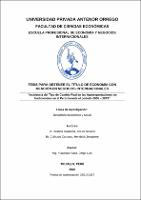Incidencia del Tipo de Cambio Real en las Agroexportaciones no tradicionales en el Perú durante el periodo 2005 – 2019

Ver/
Descargar
(application/pdf: 1.064Mb)
(application/pdf: 1.064Mb)
Fecha
2021Autor(es)
Aranda Llajaruna, Arturo Octavio
Collazos Cardoso, Hendrick Jeanpiere
Metadatos
Mostrar el registro completo del ítemResumen
El objetivo principal de la presente investigación titulada “Incidencia del Tipo de
Cambio Real en las agroexportaciones no tradicionales en el Perú durante el
periodo 2005-2019” es determinar la posible relación entre ambas variables.
El tipo de investigación de acuerdo a su orientación es básica, cuenta con una
técnica de contrastación correlacional, siendo descriptiva y analítica.
Para la realización del modelo econométrico se utilizó una serie de datos históricos
provenientes del Banco Central de Reserva del Perú (BCRP), los datos económicos
de la Reserva Federal de Estados Unidos (FED) y de las memorias de la Asociación
de Exportadores (ADEX).
La evolución de las agroexportaciones no tradicionales en Perú han tenido una
tendencia positiva, reflejando un claro crecimiento en el periodo investigado, siendo
así que en el 2005 registraron un valor de 1007 millones US$FOB, y al terminar el
periodo de investigación 2019, se registró un valor de 6340 millones US$FOB, con
un crecimiento acumulado de 530%. Es importante mencionar que Perú ha tenido
un crecimiento económico sostenible, siendo las agroexportaciones no
tradicionales un sector relevante para contribuir con dicho crecimiento económico.
La teoría que se ha utilizado en esta investigación sugieren que el Tipo de Cambio
Real y los Términos de Intercambio influyen en las exportaciones. En esta tesis se
llega a demostrar que el Tipo de Cambio Real no es estadísticamente significativo
con las agroexportaciones no tradicionales peruanas; por ende, se hace uso de
otras variables explicativas, como el PBI de Estados Unidos como principal socio
comercial y los términos de intercambio. Se hizo esto con el fin de tener un modelo
mejor especificado. Tanto el PBI americano como los términos de intercambio
tienen una relación directa y significativa con las agroexportaciones no tradicionales
peruanas, siendo el PBI americano una variable fuertemente correlacionada con la
variable de estudio. The main objective of this research entitled ““Incidence of the Real Exchange Rate
in non-traditional agricultural exports in Peru during the period 2005-2019““ is to
determine the possible relationship between both variables.
The type of research according to its orientation is basic, it has a correlational
contrasting technique, being descriptive and analytical.
To carry out the econometric model, a series of historical data from the Central
Reserve Bank of Peru (BCRP), economic data from the United States Federal
Reserve (FRED) and the reports of the Exporters Association (ADEX) were used.
The evolution of non-traditional agro-exports in Peru has had a positive trend,
reflecting a clear growth in the investigated period, being thus in 2005 they
registered a value of US $ 1007 million FOB, and at the end of the investigation
period 2019, It registered a value of US $ 6,340 million FOB, with an accumulated
growth of 530%. It is important to mention that Peru has had sustainable economic
growth, with non-traditional agro-exports being a relevant sector to contribute to said
economic growth.
The theory that has been used in this research suggests that the Real Exchange
Rate and the Terms of Trade influence exports. In this thesis it is possible to
demonstrate that the Real Exchange Rate is not statistically significant with nontraditional Peruvian agro-exports; therefore, other explanatory variables are used,
such as the GDP of the United States as the main trading partner and the terms of
trade. This was done in order to have a better specified model. Both the American
GDP and the terms of trade have a direct and significant relationship with nontraditional Peruvian agricultural exports, with the American GDP being a strongly
correlated variable with the study variable.
Palabras clave
Colecciones
- Economía y Finanzas [101]

